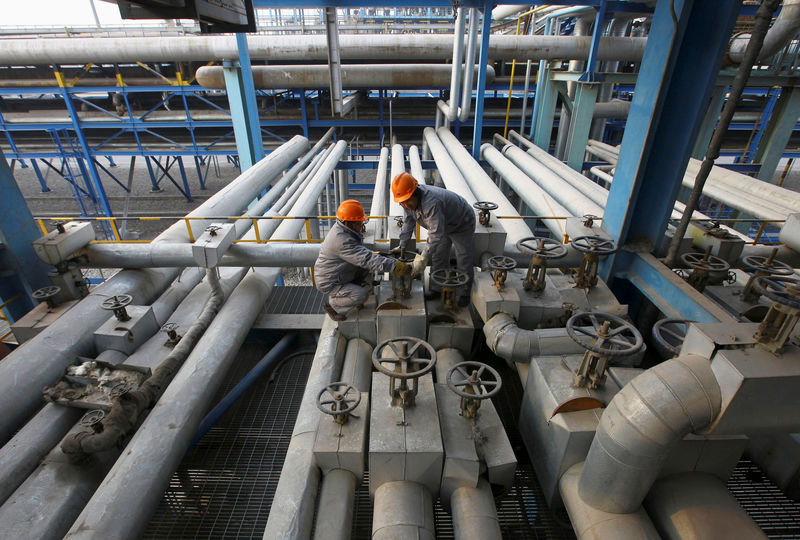By Meng Meng and Chen Aizhu
BEIJING (Reuters) - China's state oil refiners are readying to export more diesel and gasoline in coming months as a bleak outlook for what is typically the nation's period of greatest consumption sends shivers through an already saturated global market.
Even with winter heating demand looming and drivers expected to hit the roads for a week-long national holiday in October, more than a dozen refiners, traders and analysts in the world's second-largest oil consumer said the fourth quarter will be governed by a supply glut and sluggish local uptake.
Slackening demand this year and surging output from China's small independent refiners have swollen local inventories and spurred state-owned oil companies to sell refined products abroad. In July, such shipments hit a record, with the country becoming a net exporter of fuel for the first time in at least three years.
"Sales guys at refiners are now really scratching their heads worrying about meeting monthly targets," said Li Yan, a Zibo Longzhong Information Technology analyst, of the difficulty the state companies are having in their domestic markets.
Analysts from Zibo Longzhong and China Sublime Information Group now say combined demand for diesel and gasoline will fall in the fourth quarter for the first time on an annual basis since the world economic crisis of 2009.
Sources at four plants - owned by Sinopec, PetroChina and CNOOC and ranked among China's top ten oil refineries - said the outlook leaves them little choice but to branch out further into foreign markets.
PetroChina's Dalian plant, its largest with a capacity of 410,000 barrels per day (bpd), illustrates the dilemma the refiners face.
Instead of preparing for a seasonal uptick in domestic demand, the plant is looking to sell more in foreign markets in November and December as local margins weaken, a senior manager at the plant told Reuters. He declined to be named because he's not authorized to speak to the press.
Struggling to find local buyers for its products, PetroChina has also already cut the Dalian plant's utilization rate to 80 percent from 85 percent in recent months.
"The start of the fishing season (in October) will bring more diesel demand for us, but (the) market remains saturated with oversupply," the manager said.
DIVERGING FORTUNES, MOUNTING TENSION
While refineries along the coast and near big cities are making decent profits as demand is more robust, in the north and south margins have declined as consumption has waned and a supply glut has ballooned.
"Cutting runs will be our last resort if the overseas markets are full and we cannot export," said a senior manager at CNOOC's major plant in Huizhou in southern Guangdong province.
China's rising exports and the managers' complaints about low refinery profits are the latest signs of the diverging fortunes and mounting tension between state-owned players and their upstart independent rivals.
Since Beijing allowed the refiners known as teapots to import cheap crude last year, this small, nimble group of mostly private companies has ramped up output and undercut the state refiners in retail markets.
That pain has intensified as gasoline and diesel demand fell 7 percent in the first seven months of 2016, according to Reuters calculations.
That compares with gasoline and diesel demand growth of 3 percent in 2015 and 6 percent in 2014.
Fourth quarter demand - though expected to be down versus a year ago for the first time in seven years - will improve slightly from the previous quarter, but not enough to wipe out the glut, analysts and industry insiders said.
'SKY HIGH' EXPORT LEVELS
Threats of more exports will be tough to swallow for a region already reeling from China's accelerating pace of shipments.
The shipments also intensify the battle for market share with rivals in South Korea and Japan, sources in those countries said, with repercussions to be felt well beyond Asia.
"A step up from current levels is sky high. The middle distillates market will die if that's true," said an official with a refiner based in Japan.
A manager at Sinopec's Guangzhou refinery in South China said that PetroChina's plans to launch its 260,000 bpd plant in southwest Yunnan province in October will exacerbate the market's woes.
Sinopec has said it expects to cut domestic sales in the second half of the year by 3 percent to 84 million tonnes.

It made no forecast on overseas sales, but Sinopec's product exports rose 18 percent in the first half of 2016, outpacing a 3 percent rise in home deals.